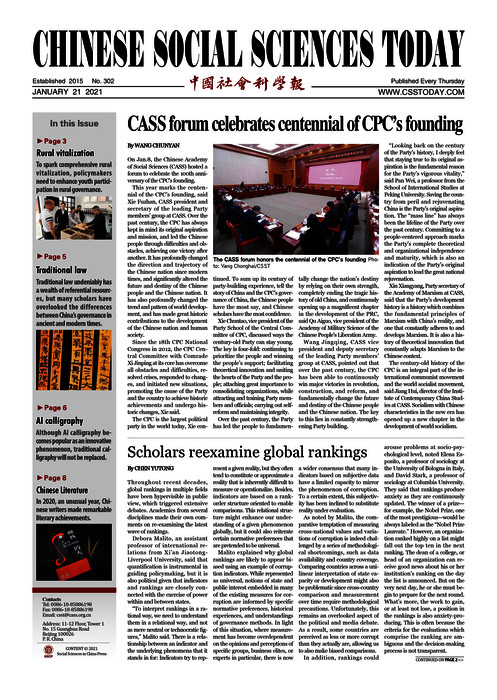Scholars reexamine global rankings
2021-01-19 16:17:03
By CHEN YUTONG
Throughout recent decades, global rankings in multiple fields have been hypervisible in public view, which triggered extensive debates. Academics from several disciplines made their own comments on re-examining the latest wave of rankings.
Debora Malito, an assistant professor of international relations from Xi’an Jiaotong-Liverpool University, said that quantification is instrumental in guiding policymaking, but it is also political given that indicators and rankings are closely connected with the exercise of power within and between states.
“To interpret rankings in a rational way, we need to understand them in a relational way, and not as mere neutral or technocratic figures,” Malito said. There is a relationship between an indicator and the underlying phenomena that it stands in for: Indicators try to represent a given reality, but they often tend to constitute or approximate a reality that is inherently difficult to measure or operationalize. Besides, indicators are based on a rank-order structure oriented to enable comparisons. This relational structure might enhance our understanding of a given phenomenon globally, but it could also reiterate certain normative preferences that are pretended to be universal.
Malito explained why global rankings are likely to appear biased using an example of corruption indicators. While represented as universal, notions of state and public interest embedded in many of the existing measures for corruption are informed by specific normative preferences, historical experiences, and understandings of governance methods. In light of this situation, where measurement has become overdependent on the opinions and perceptions of specific groups, business elites, or experts in particular, there is now a wider consensus that many indicators based on subjective data have a limited capacity to mirror the phenomenon of corruption. To a certain extent, this subjectivity has been inclined to substitute reality under evaluation.
As noted by Malito, the comparative temptation of measuring cross-national values and variations of corruption is indeed challenged by a series of methodological shortcomings, such as data availability and country coverage. Comparing countries across a unilinear interpretation of state capacity or development might also be problematic since cross-country comparison and measurement over time require methodological precautions. Unfortunately, this remains an overlooked aspect of the political and media debate. As a result, some countries are perceived as less or more corrupt than they actually are, allowing us to also make biased comparisons.
In addition, rankings could arouse problems at socio-psychological level, noted Elena Esposito, a professor of sociology at the University of Bologna in Italy, and David Stark, a professor of sociology at Columbia University. They said that rankings produce anxiety as they are continuously updated. The winner of a prize—for example, the Nobel Prize, one of the most prestigious—would be always labeled as the “Nobel Prize Laureate.” However, an organization ranked highly on a list might fall out the top ten in the next ranking. The dean of a college, or head of an organization can receive good news about his or her institution’s ranking on the day the list is announced. But on the very next day, he or she must begin to prepare for the next round. What’s more, the work to gain, or at least not lose, a position in the rankings is also anxiety-producing. This is often because the criteria for the evaluations which comprise the ranking are ambiguous and the decision-making process is not transparent.
Rachel Gisselquist, a senior research fellow with the United Nations University’s World Institute for Development Economics Research, provided a deeper dive into the practical effect driven by global measurements. According to her, governance assessments using various indexes and indicators have a variety of practical implications, in spite of their use in research and academic analysis. For instance, they may influence foreign aid allocations and investor perceptions. They may also be applied by citizens and civil society groups in considering and evaluating governance in their own countries.
In response to criticism, many researchers and practitioners have put efforts into redeveloping and optimizing the indicator framework. Malito said that within the Sustainable Development Goals (SDGs) framework, the UN is pushing the scientific community to provide better conceptualizations and measurements for governance. However, a globally shared notion of governance is difficult to achieve, and in this field the legitimacy of certain global claims to knowledge has been increasingly contested.
Concerns have emerged about the overarching acceptability, legitimacy, and actual feasibility of existing governance measures, especially regarding the monitoring of the SDGs’ governance goal: A Global North-Global South divide exists in the production and use of governance metrics, as the majority of existing measures of governance are produced in high-income economies, in North America or Europe.
The balance between homogeneity and non-homogeneity under the circumstances of globalization is also involved in reflections on global rankings. Doubravka Olsakova, a senior researcher at the Institute for Contemporary History at the Academy of Sciences of the Czech Republic, proposed that global rankings and relevant lists need to be made flexible enough to reflect various perspectives and solid enough to provide a full picture of international trends in the global landscape. It is also noteworthy that social sciences and humanities considerably shape national identity.
On top of all this re-examination, what should be the next step in practice? In Malito’s view, to release the potential of global indicators and ranking, we need to understand metrics beyond their technocratic curtain but as part of a global system of knowledge production. Better credibility and legitimacy for governance metrics might require more intellectual and policy innovation than simply adjusting ownership or participation within existing frameworks.



